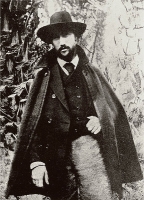fǎ guó fǎ lán xī dì sì gòng hé guó
(
1869niánshíyīyuè22rì~
1951niánèryuè19rì)
 安德烈·保尔·吉约姆·纪德
安德烈·保尔·吉约姆·纪德 ·
bǎo '
ěr ·
jí yuē mǔ ·
jì dé( 1869
héng 1951)
shì fǎ guó '
èr shí shì jì zuì zhòng yào de zuò jiā zhī yī。
tā shēng yú bā lí,
shì dú shēng zǐ;
fù qīn zài bā lí fǎ lǜ xué yuàn rèn jiào shòu;
mǔ qīn shì fù jiā guī xiù,
dǔ xìn tiān zhù jiào xīn jiào。
jì dé zǎo nián tǐ ruò duō bìng,
yì cháng mǐn gǎn。
shí yī suì shí sàng fù,
yóu mǔ qīn fú yǎng bìng gěi yú qīng jiào tú shì de jiào yù,
niàng chéng liǎo tā de pàn nì xìng gé。
cóng shí wǔ suì qǐ,
tā duì jiù fù de nǚ '
ér mǎ dé lāi nà chǎn shēng liǎo chún jié de '
ài qíng;
dàn shì liù nián hòu,
mǎ dé lāi nà jù jué liǎo tā de qiú hūn。
chuàng zuò yú 1890
nián,
yú cì nián fā biǎo de chǔnǚ zuò《
ān dé liè ·
wǎ '
ěr tè de bǐ jì》,
jiù shì tā gěi zì jǐ jiā tíng hé mǎ dé lāi nà de zuì hòu tōng dié,
fǎn yìng tā zhè yī shí qī de sī xiǎng。 1895
nián,
tā zhōng yú tóng biǎo jiě mǎ dé lāi nà jié hūn,
dàn hūn hòu shēng huó bìng bù měi mǎn,
tā réng bù gǎi tóng xìng liàn pǐ,
zhì shǐ tā qī zǐ yì yù chéng jí,
yú 1938
nián sǐ qù。
André Paul Guillaume Gide (French pronunciation: [ɑ̃dʁe pɔl ɡijom ʒid]) (22 November 1869 – 19 February 1951) was a French author and winner of the Nobel Prize in literature in 1947. Gide's career ranged from its beginnings in the symbolist movement, to the advent of anticolonialism between the two World Wars.
Known for his fiction as well as his autobiographical works, Gide exposes to public view the conflict and eventual reconciliation between the two sides of his personality, split apart by a straight-laced education and a narrow social moralism. Gide's work can be seen as an investigation of freedom and empowerment in the face of moralistic and puritan constraints, and gravitates around his continuous effort to achieve intellectual honesty. His self-exploratory texts reflect his search of how to be fully oneself, even to the point of owning one's sexual nature, without at the same time betraying one's values. His political activity is informed by the same ethos, as suggested by his repudiation of communism after his 1936 voyage to the USSR.
